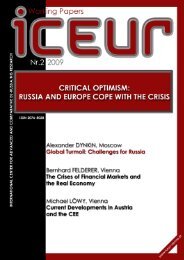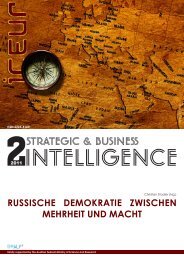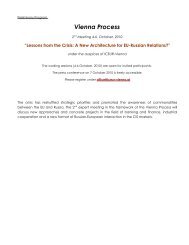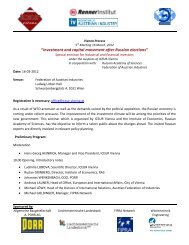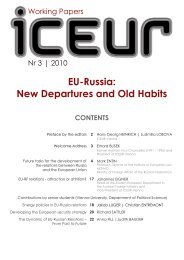International Center for Advanced and Comparative EU-Russia
International Center for Advanced and Comparative EU-Russia
International Center for Advanced and Comparative EU-Russia
Create successful ePaper yourself
Turn your PDF publications into a flip-book with our unique Google optimized e-Paper software.
THE BALKANS: POWDER KEG OR GOLD MINE?Mascha DABIĆThe nineties of the last century saw bloodshed in <strong>for</strong>mer Yugoslavia, which in a harrowing way confirmed thestereotype of the Balkans as an area riddled with ethnic strife <strong>and</strong> conflict. The unexpected ferocity whicherupted during the Yugoslav civil war (1991-1995) took the international community by surprise, because theconflict took place in a multi-ethnic state with an underlying socialist constitutional doctrine, which had laiddown the reduction of ethnic <strong>and</strong> national tensions through the creation of a superordinate federal level as a majorpriority.Global attention was again riveted to the situation in the Balkans in February 2008, when the latest step in thedisintegration of Yugoslavia took place. Kosovo's unilateral declaration of independence from the Republic ofSerbia on 17 February, 2008 was not perceived as a local problem, because the Kosovo case touched upon thefoundation of international law, namely the principle of territorial integrity versus the right of self-determination.The <strong>Russia</strong>n Federation was one of the few countries which did not accept the unilateral declaration ofindependence <strong>and</strong> which called <strong>for</strong> an amicable conflict solution, also <strong>for</strong> fear of separatist movements on its ownterritory.Six months later the repercussions of this political earthquake reached Georgia, where the debate on internationallaw took place again. However, this time it was <strong>Russia</strong> that argued against Georgia's territorial integrity.The 1974 constitution of the Socialist Federative Republic of Yugoslavia did not succeed in openly addressingthe contradiction between self-determination <strong>and</strong> territorial integrity, let alone in solving the problem. Complexethno-political configurations <strong>and</strong> complicated decision-making mechanisms were <strong>for</strong>mulated imprecisely,which resulted in a broad space <strong>for</strong> interpretation. The constitution distinguished between people (narod) <strong>and</strong>nation (narodnost); however, in the case of multi-national Bosnia the constitution did not specify whether theethnic or the territorial dimension was decisive. Also, it did not exactly define the relation between the provinceof Kosovo <strong>and</strong> the Republic of Serbia, so that due to generous veto rights Kosovo was de facto able to act as anindependent unit within the framework of Yugoslavia. Also, labelling one ethnic group living in Bosnia asmuslims (muslimani) was misleading, because there were also people(s) of Islamic denomination outsideBosnia. Besides, the Bosnian Muslims should not have been reduced to the religious dimension only, as inYugoslavia religion primarily functioned as an expression <strong>for</strong> national interests <strong>and</strong> as a key factor <strong>for</strong> ethnicidentification, which was always present in society, despite the official state ideology which was based on“bratstvo i jedinstvo” (“brotherhood <strong>and</strong> unity”). Against the backdrop of escalating conflicts at the beginning ofthe nineties, the constitution provided no answer to the crucial question, whether the right of self-determinationwas granted to an ethnic group or to a territorial-administrative unity.At present, <strong>Russia</strong>'s involvement with the Balkans is focused on economy rather than on politics. On 18 January,2008, <strong>Russia</strong>'s president Vladimir Putin signed an agreement in Sofia between <strong>Russia</strong>, Greece <strong>and</strong> Bulgariaregarding the South Stream gas pipeline. <strong>Russia</strong> might get an edge over the <strong>EU</strong> in gas <strong>and</strong> energy markets, if theSouth Stream project comes into being. Also, Serbia <strong>and</strong> the Serbian Republic (Republika Srpska) are supposedto participate in the project, thus adding a concrete economic dimension to the traditional <strong>Russia</strong>n-Serbianfriendship, which commonly lacks substance, but is ubiquitous in political rhetoric. On the other h<strong>and</strong>, the <strong>EU</strong> istrying to exert influence on the Balkans by offering membership perspectives to Balkan states. Whether <strong>Russia</strong><strong>and</strong> the <strong>EU</strong> will succeed will, among other things, depend on the global financial crisis. In any case, thetraditional rivalry between “East” <strong>and</strong> “West” will continue on the geopolitically <strong>and</strong> strategically importantterritory of the Balkans in the <strong>for</strong>m of economic competition.– 12 –




